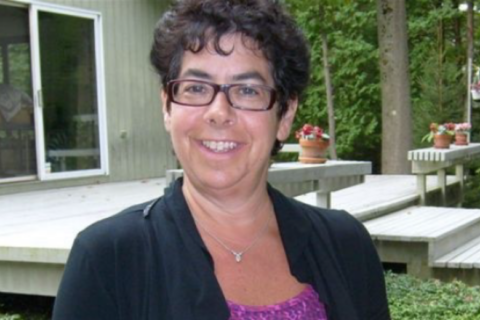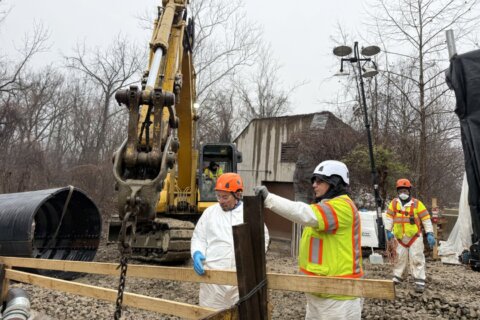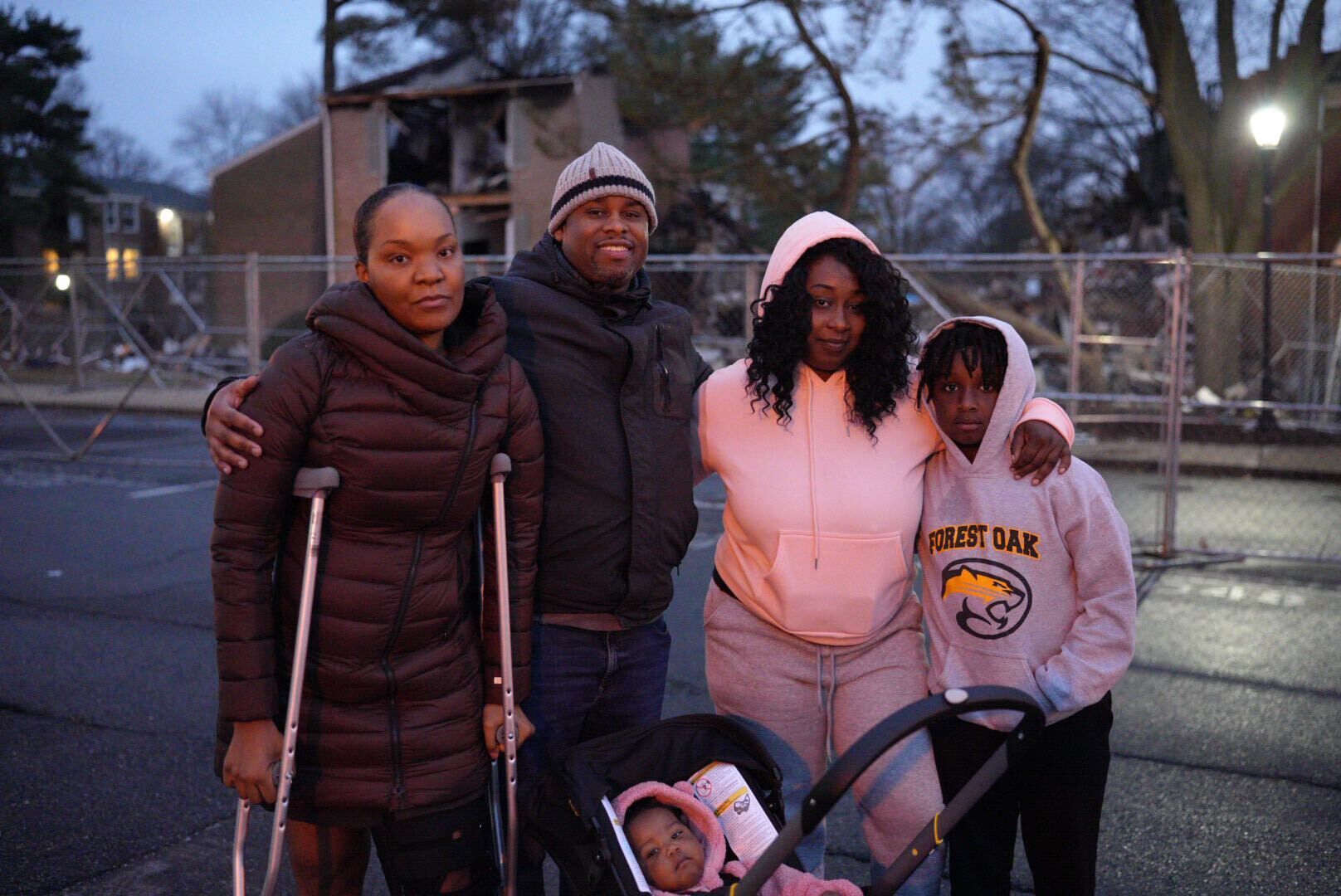
On Nov. 16, an explosion and fire ripped through the Potomac Oaks Condominium in Gaithersburg, Maryland, destroying two buildings and damaging two others — and leaving many families without a place to live.
Now, two months later, several families are revealing the struggles they’ve faced trying to keep a roof over their heads long after the rubble has stopped smoldering and the story has faded from the headlines.
From delays in insurance payouts to the difficulties in finding a new — and affordable — place to live, many say the trauma of that day has been compounded by what they experienced after.
The St. Jour family: ‘Christmas was brutal’
Marc St. Jour, 38, recalled the gut-wrenching feeling he had the day of the blast as he rushed home from work after his wife Sarah called him to say their building was on fire. As he neared the building, he saw the smoke billowing from the wreckage of the condo building and worried if his wife and their infant daughter, Eva, made it out alive.
“When I get there, there’s nothing left of my place. I see it completely on fire,” said St. Jour, who works as a paralegal at a Gaithersburg law firm.
His wife suffered smoke inhalation — but has since recovered. St. Jour said little did he know the trauma wouldn’t end that day.
St. Jour’s father, who has the same name, helped him buy the condo in 2020, and while the younger St. Jour was on the deed, it turned out the insurance for the contents inside the condo didn’t include him as someone additionally insured by the policy.

At first, St. Jour said, the insurance company, State Farm, said they would cover his hotel room. St. Jour provided WTOP a letter sent to him on Nov. 16, outlining the coverage available to him.
At that point, St. Jour said he believed he was covered in full. But two days before Christmas, he said he was told because he wasn’t named in the policy, his family’s coverage had ended — and they were on their own.
“Christmas was brutal,” St. Jour said.
He said they survived by driving to New York to stay with family over Christmas, and spending what little money they had left to come back to the area and stay in hotels.
St. Jour said he sought help from Montgomery County representatives, but it appeared to him the only option was to take his family to a shelter.
Patrick Campbell, senior planning manager for mass care operations with the county’s Department of Health and Human Services, said shelters are an option the county will turn to for families with no other place to live. The county in many cases turns to hotels to cover situations in which there is not enough room in area shelters.
Campbell said the county’s goal is helping families with long-term solutions, and when a place is found, the county will help cover some of the initial costs of getting set up in a rental, including the first month’s rent.
As for St. Jour, he ended up applying for temporary housing after he said calls to his insurance representative went unanswered for over two weeks. It was only after WTOP contacted State Farm about his situation, St. Jour said, that the same representative, who had called him before the holiday, contacted him again to say his family will be covered for the belongings they lost and for the cost of hotels.
State Farm spokesperson Justin Tomczak told WTOP that he can’t speak directly about St. Jour’s case due to privacy rules, but he did confirm State Farm is speaking with St. Jour and his father to resolve any questions or concerns.
“With any claim, State Farm seeks to provide our customer all benefits to which they are entitled within the terms of the insurance policy,” Tomczak said in an email.
St. Jour said the family did receive several thousand dollars from a fund set up by Montgomery Housing Partners to collect donations for affected families, along with donations from several other organizations, including the Red Cross and a GoFundMe setup for the family. He said the kindness of the many people who donated helped them keep a roof over their heads.
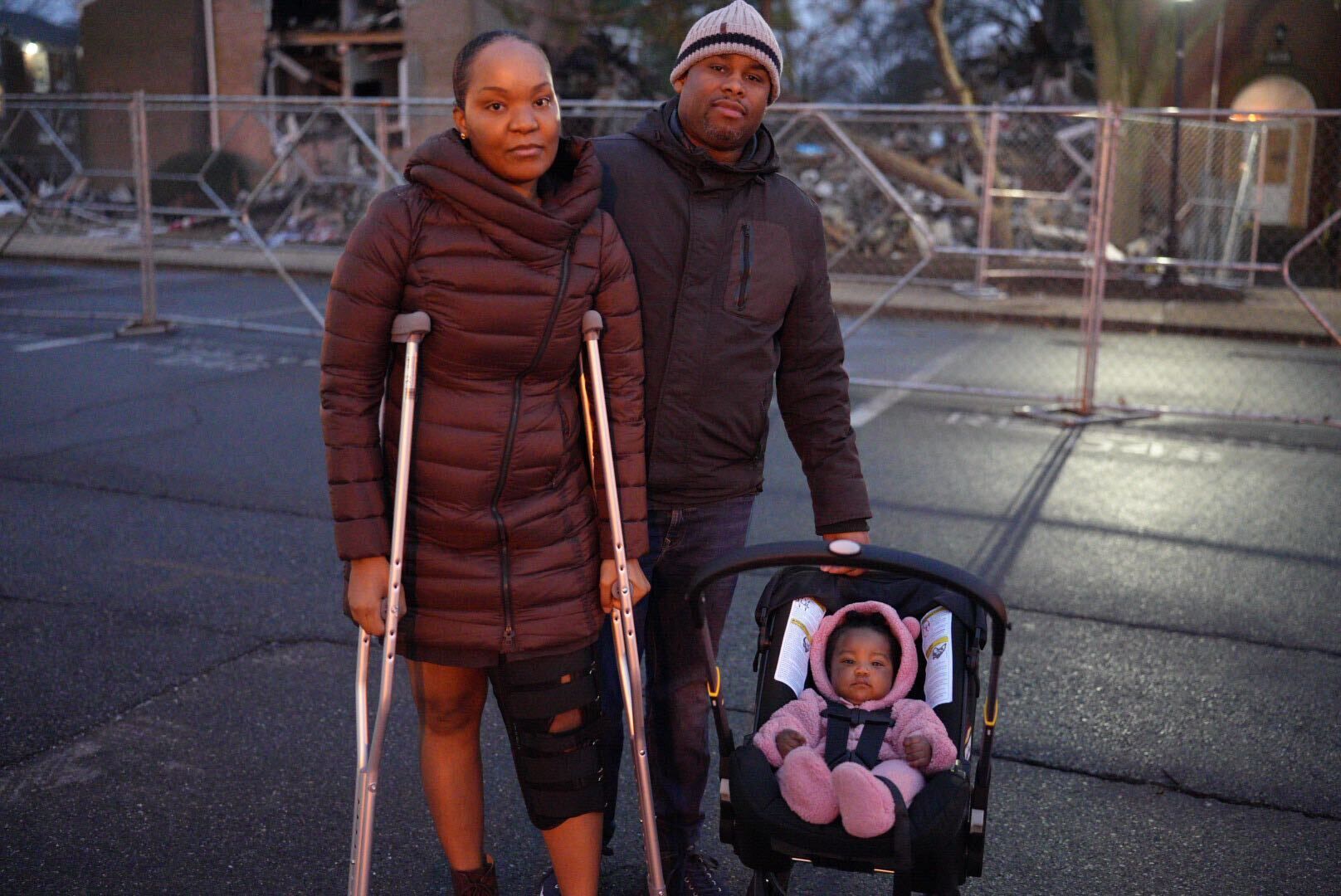
“If it wasn’t for them, this would be a whole different story,” he said. “We literally would probably be living in the car.”
St. Jour said the ordeal has taken a toll on both his physical and mental health, and also a toll on his professional life, since he doesn’t want to return to work full time without a home for his family.
“This affected my health; I was seriously going through a depression, silently,” St. Jour said. “I mean, I didn’t know what to do.”
He added, “No one should ever have to go through this.”
The Zhuang family: ‘We just lost everything’
On the day of the blast, Liz Zhuang had just arrived at work after dropping her children off at school, when she received a phone call from her aunt telling Zhuang her house was on fire.
“I was like, ‘Are you joking?’” recalled Zhuang, 42, who works as a clerk for the state.
As she tried to make it home, Zhuang said she could see clouds of smoke and first responders rushing to the scene. Once there, she discovered her family lost everything.
Her husband went to pick up their kids, and they were referred to a temporary shelter. Zhuang said concerns about staying there with her young daughter led the couple to decide to go to a hotel.
Zhuang said she had let a previous insurance policy lapse just a week before the blast and was still shopping around for a new policy, leaving her family uninsured.
For Zhuang, the several thousand dollars her family received in help went fast, starting with the first several hundred dollars going toward replacement key fobs for the family’s vehicles.
More difficult to replace: Thousands of dollars’ worth of immigration paperwork that was destroyed in the blast, Zhuang said. According to Zhuang, Sen. Chris Van Hollen’s office is assisting the family because they didn’t have copies of identification numbers and other important information contained in that paperwork.
The county ended up covering a hotel for the family through January and — thanks to the advice of a social worker — Zhuang said she was able to find an apartment. Now the struggle is accessing all the financial assistance she was told was available from the county and the city of Gaithersburg, she said.
Zhuang said she’s now receiving $400 a month in help from the county and has also applied for rental assistance from the city of Gaithersburg. She has also received just over $2,500 from a GoFundMe campaign set up by a colleague.
Yet another struggle for both Zhuang and St. Jour is that as owners of their units, they are still having to pay $650 a month for the condo’s homeowners association fee.
WTOP reached out to Potomac Oaks Condominiums about the continued HOA fee over the phone, and was told “no comment” before the call was ended.
Campbell, the county Health and Human Services official, said he has been told that since the HOA fee included a utilities, the condo complex is waiving some of the cost but not all of it. Campbell said his understanding is that the remaining portion covers insurance costs for the building, which will be used to rebuild the damaged buildings.
“But there’s no legal mechanism for (the county) to waive it,” Campbell said.
Single mom Sequoia Royster: ‘I have no support’
Sequoia Royster, 28, was inside her rented condo at the complex with her two young children on the day of the blast. She recalled the building shaking, and her 65-inch TV and other items in her home flying off the wall and hitting her and her 3-year-old son.
“Everything was just falling on our heads, like the whole foundation above us. Everything was just hitting us in our head, left and right,” Royster said.
Another son, 9, was in the bathroom at the time. The blast trapped him inside and Royster said she had to break both her bedroom door and bathroom door to get to him.

They were able to make it out, but she said both she and one of her sons are still coping with back injuries from that day. Royster said the injuries have also kept her from being able to return to work as a delivery driver for Amazon and Walmart after the explosion, so she currently has no money coming in other than donations received from the county and from a GoFundMe page set up for her.
The emotional toll of the event has also been overwhelming, she said, leaving her dealing with depression. Her youngest son still struggles with nightmares.
“At nighttime, he always says, ‘Fire, fire,’” Royster said.
Her older son’s grades have slipped since the blast, and he’s even been the target of bullies, she said.
“Kids at school, like, call him homeless and (say) ‘your mom’s poor because she can’t buy another house’ and things like that,” Royster said.
Royster, a single mom, did not have renter’s insurance because she said she couldn’t afford to pay the premiums.
Picking up the pieces has been difficult.
She could afford the $1,250 a month she paid in rent at the time of the explosion, but now she is unable to find anything nearby in that price range.
She’s been staying at a hotel with her children since the blast, but she said she received a call from the county in early January informing her that hotel stays would no longer be paid for by the county, and that to receive housing assistance, she would have to move into a shelter on Tuesday.
“I was, like, really depressed when I called them. I was crying because like, you know, this is just overwhelming,” Royster said.
Royster said she searched for apartments around the area with the hope that her son could remain in his school, but has not found anything she can afford. She said she has also looked as far north as Frederick with no luck.
For Royster, with no income currently coming in, that has also limited her options.
“I just want housing for our kids, like we’ve already been through a traumatizing situation,” Royster said.
Campbell, the county Health and Human Services official, said while the county can help get people into rentals, it is unable to be a long-term solution for covering the rent.
“When they do look for that place before we’re going to pay security deposit and rent, we have to have proof that they can continue to pay rent after we’re no longer part of” providing assistance, Campbell said.
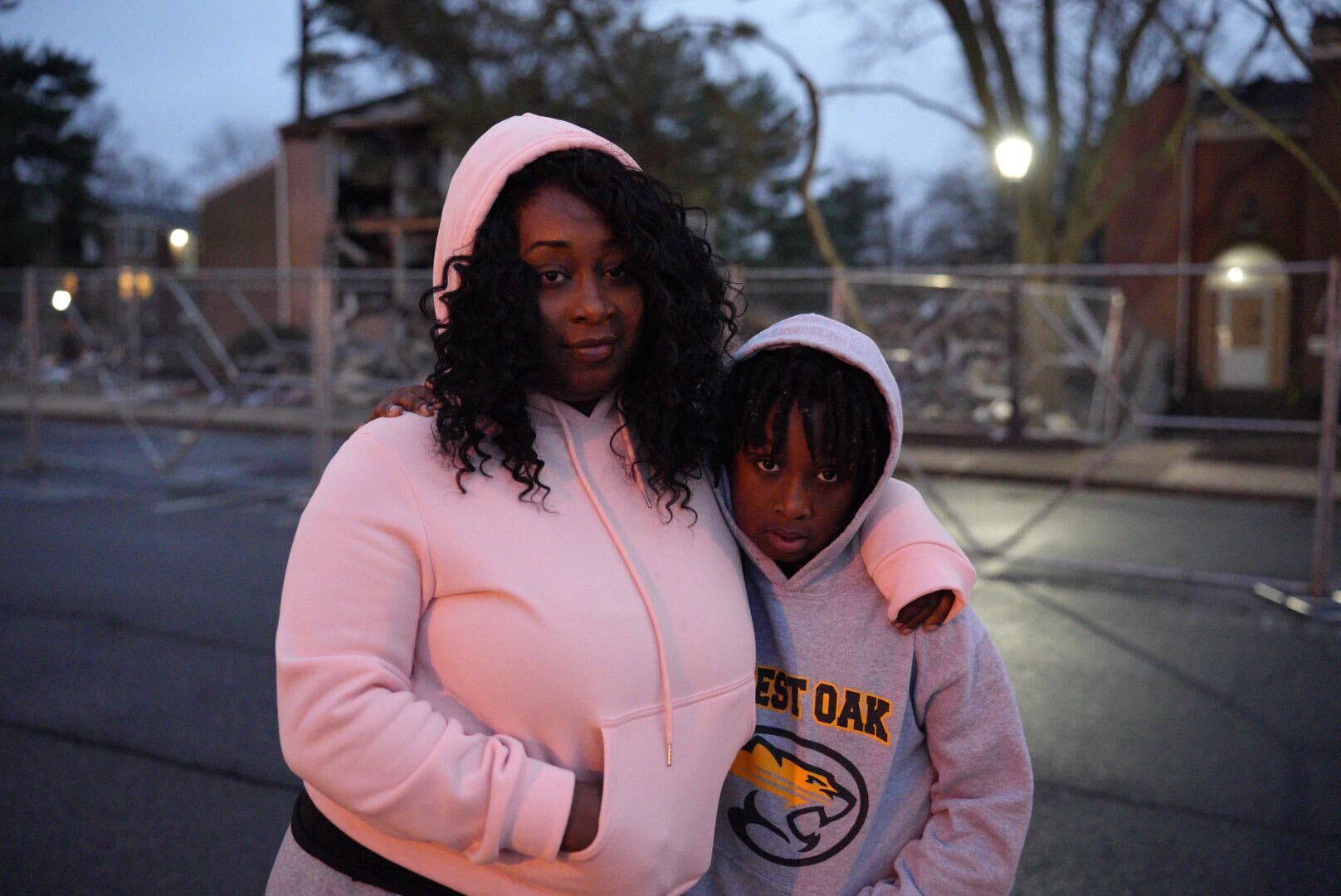
WTOP also reached out to the Montgomery County Housing Opportunities Commission to learn if it had affordable housing units that could be made available to survivors of the blast, which has been described as a disaster.
Spokesperson Tia Blount said Royster could qualify for a Housing Choice Voucher — part of a federal program that assists very low-income families — but she said that request must come from the county executive’s office.
WTOP has reached out the Montgomery County Executive Marc Elrich and the Department of Health and Human Services about this request.
Mary Anderson, a spokesperson with the county’s Department of Health and Human Services, said in an email that the agency has not asked for the special request from the county executive because “this situation does not meet the criteria set out in HOC’s policy.”
Anderson provided an excerpt from the Housing Opportunities Commission’s procedure plan located in Section 6, Chapter 4, which said that criteria for “First Local Preference” is for:
Families who are displaced as a result of a State or County redevelopment project, or a change in the nature of a project that is part of the County plan for maintaining affordable housing, and who are referred by the County Executive’s Office. A signed certification from the County Executive’s office is required for the family to qualify for this preference.
However, a review of the Housing Voucher Administrative Plan’s Section 6, Chapter 4, dated July 13, 2022 said the criteria for “First Local Preference” is
Families who are displaced as a result of a fire, flood, natural disaster, State or County redevelopment project, or a change in the nature of a project that is part of the County plan for maintaining affordable housing, and who are referred by the County Executive’s Office. A signed certification from the County Executive’s office is required for the family to qualify for this preference.
In response, the county’s Department of Health and Human Services told WTOP was “not aware the criteria had changed.” It is working to get a letter to the county executive for a signature.
Local governments respond
After the explosion, the county solicited help from the community and raised $126,137 in donations in cooperation with the nonprofit Montgomery Housing Partnership. Since that money was raised, $113,750 of it has been distributed to families, according to Chris Gillis, director of policy and neighborhood development with MHP.
While a lot of money was raised for the victims of this tragedy, the community turned out to be far less generous than in the wake of an earlier building explosion in Montgomery County. After a gas explosion and fire in March at the Friendly Garden Apartments in Silver Spring, the community fund raised $570,000 for the victims.
Campbell said how much an individual got in donations was decided on a case-by-case basis.
“People who were uninsured, obviously, got a little bit more,” he said, adding that payouts also varied by family size and also the extent of the property damage.
On average, Campbell said each family received between $6,000 and $9,000.
“What we’ve been trying to work on for a number of these families is to find that next apartment,” Campbell said.
Campbell said his team has been making victims aware of housing subsidies available to help lower rental costs, and has also informed survivors of a program in which the county will cover the first month’s rent and security deposit for disaster victims once they find a new place to live.
Campbell said payouts from the donation fund went out relatively quickly, despite the hurdles that exist in disaster-type situations. Among them was figuring out who actually lives at an impacted property, since he said there have been cases of people claiming to live somewhere that has been impacted by a disaster who actually don’t live there.
Campbell said a special team of case managers were set up for this incident, and he urges those still in need to contact the county.
“The most important thing to realize with any recovery and, I say this myself, being a disaster survivor … the county can do part of it; you know, the community does part of it, and then the individual all has to be part of it,” he said.
Campbell said assistance has also been offered for food and furniture referrals once new homes are located, in cooperation with the nonprofit A Wider Circle.
Tanisha Briley, city manager for the City of Gaithersburg, said that while the overall disaster response is being led by the county, the city is assisting in helping residents, such as Zhuang, apply for rental assistance under the Federal Community Development Block Grant.
Briley said Zhuang has been approved for the assistance, and it will cover three months of her rent, which is in addition to the county covering her first month of rent.
Can more be done?
While the money has helped, all three families WTOP spoke with said the process of working with the county has been confusing, and sometimes requests had gone unanswered.
Tiffany Kelly, a community advocate in the region, said families began to reach out to her in the weeks after the blast, claiming they were not offered services that she said should have been made available to them.
“I know that the county has services for housing,” Kelly said. “They can give emergency vouchers; they can give rental assistance and that wasn’t being offered to any of these families.”
According to Campbell, the county official, his records show case workers have been working with all the impacted families and offering them services that are available to them.
Montgomery County Council member Laurie-Anne Sayles has been speaking with some of the impacted families and said one question she has is how many affordable housing units are available in the county and how those can be made available to people in these situations.
Sayles also wants a closer look at what factors affect the distribution of financial assistance in these situations.
“We don’t have immediate access to those numbers and so hoping that incidents like these won’t end up with families, you know, falling through the cracks because of a problem with or insurance or otherwise,” Sayles said. “We have to find sustainable ways to effectively respond and support our families who are going through, you know, these trying times.”
Council member Sidney Katz, whose office is also assisting some of the affected families, said while many agencies have done a good job in responding to this, the county should always be assessing how things can be done better.
“The county needs to make certain that whatever relief we can give, we’re giving as well as helping to make certain that the project gets back to be built as quickly as possible,” he said.


